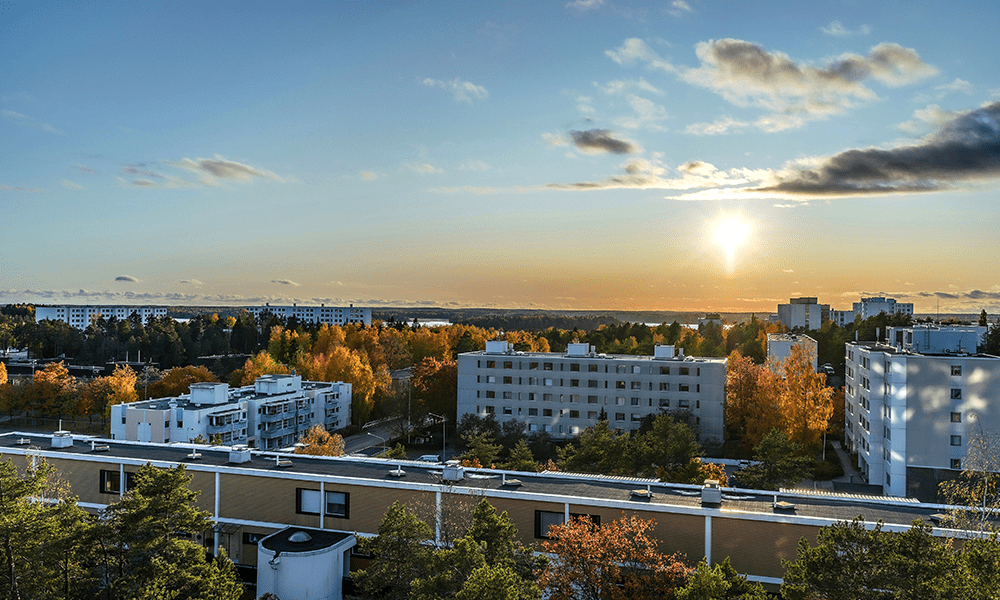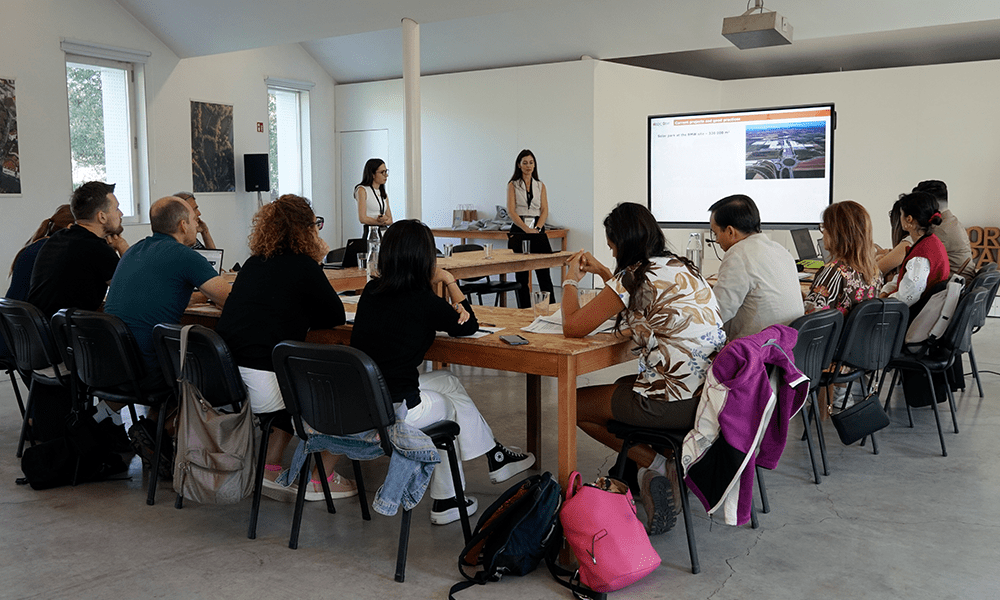Author: Elisa Abrantes
Stories from Pilot Cities: Nantes is one of the 112 cities participating in the EU Mission to deliver 100 climate-neutral and smart cities, and the Pilot Cities Programme – a component of the Mission that focuses on exploring and testing pathways to rapid decarbonisation over a two-year period.
The French city of Nantes, famed for being the birthplace of surrealism and home to writer Jules Verne, is becoming a visionary urban centre, placing community at the heart of sustainability. The city and its surroundings, known as ‘Nantes Métropole’, has adopted a renewed approach to community engagement which is being used as a vehicle to achieve more holistic and systemic climate action, better inform climate policy, and get a broader range of residents involved through pioneering approaches to local partnerships.

An Atlantic port city, nestled into the estuary of the Loire River, Nantes sees itself as a city for everyone, where community is a fil rouge – a red thread – guiding the work, including in the field of sustainability.
“Nantes Métropole has two very strong priorities. One is the environment, and the other is to remain a place of social cohesion with a strong emphasis on community life. This axis is where much of our climate work is focused. A healthy, sustainable city is a way to reinvigorate community through common values related to health, culture, food, mobility, among others,” says Elise Lindner, Ecological Transition Project Manager, Nantes Métropole.
A local climate plan has been in place since 2007 and aims to reduce the consumption and CO2 emissions per inhabitant by half by 2030 through a strong focus on renewable energy sources and on the social aspects of citizen engagement and participation.
Since 2011, it has hosted citizen challenges to foster behaviour change towards more climate-friendly practices. These challenges have featured the topics of zero-waste, sustainable food, and energy saving, with each taking place on a yearly basis.
“As a city, we need to realise that imposing change doesn’t work. We also need to realise that we don’t always have the best ideas – these often come from citizens and local organisations themselves. If citizens feel they can take ownership of something and adapt it to their own needs, that will ultimately be more successful. We cannot create a sustainable future without citizens. Public policy can be a great instrument, but if it’s not in tune with the people it’s serving, it will not achieve its objectives,” argues Lindner.
Nantes Métropole applied to the Pilot Cities Programme with their project ‘Together Towards Climate Neutrality’, seeing it as a valuable opportunity to scale up the citizen challenges. This is also a way to increase their ability to involve more citizens in the city’s climate goals, and to learn from them what the main barriers are to long-term, sustainable behaviour change.
Pairing climate with community – and enjoyment – is how they aim to do this, and thus address the concern that their efforts have so far mostly reached those who already have an interest in climate and sustainability.
“Making citizens aware is very important, but it’s not enough. Since 2011, we noticed that, through the challenges, there were changes in behaviour and very concrete savings in energy consumption. The main limitation was that we usually reached the same people. This convinced us that we should keep doing the challenges, but increase their reach and take a more systemic and holistic approach. This is how our project for the Pilot Cities Programme came to life,” says says Sandrine Laisné, Ecological Transition Project Manager, Nantes Métropole.

The goal of increasing the scale and reach of the existing challenges involves mobilising six partners to set up future challenges, aiming to reach 1000 households per year, while also engaging new audiences and featuring new themes that encompass all aspects of daily life that have an impact on emissions. Another objective is to obtain feedback from participants to identify obstacles to individual action and help develop fit-for-purpose public policy that enables behaviour change.
Relay engagement
The city is partnering with Nantes University and the employer association Dirigeants Responsables de l’Ouest to target a wide group of citizens: employers, employees, students, and other residents. They are also targeting local residents via a partnership with SAMOA, a public body and a vibrant cultural hub in the Île de Nantesan island in the city centre surrounded by the Loire River. Each of the partners is responsible for identifying other partners to recruit participants and run the challenges.
The city’s approach to partnering with third parties who can run the challenges means that they can mobilise more diverse audiences and increase their reach. The partners’ role is to lead and run the challenges. The city acts as a coordinator and trainer, ensuring all challenges meet specified requirements, and training partners who run them.
The challenges themselves have a strong climate component, reflected in their name: ‘Les défis climat pour les habitants’ (climate challenges for residents), but they all deliberately bring in other elements that may be less clearly linked to climate. One example challenge involves cycling to visit an organic farm and learn about sustainable agriculture and food, introducing mobility, education, and sports into a holistic view of how these elements are interconnected. Another teaches people to ‘vegetalise’ their cooking and learn how to prepare balanced, healthy vegetarian meals.
“It’s not about punishing people for climate change. We are all responsible, but we’re also all victims in a way. It’s about engaging people in something that feels positive and brings about sustainable changes,” says Elise Lindner.
Participatory energy and climate policy
Alongside the goal of increasing the number of challenges, the city is looking to learn whether this approach will increase their ability to reach ‘unusual target groups’ – people who were not previously involved – and whether the partnership with different actors with strong community ties could more closely align the citizen challenges with the interests of such groups.
Nantes recognises that sustainable change is often hindered by structural, financial, or legal barriers. Through interviews and focus groups conducted as part of the programme, the city is using these challenges to find out what these are, and to inform how they could make better use of public policy to suit residents’ needs, making the sustainable choice the easier choice.
Feedback will be collected via a continuous evaluation process of qualitative and quantitative data, managed by Gustave Eiffel University.
From the citizen or user perspective, the challenges come together via an online application, DECLICS, which was developed in cooperation with energy related non-profits Alisée and Hespul to facilitate their involvement. It allows challenge participants to assess their carbon impact and savings, register for individual mini-challenges listed on the application, or join a collective challenge.
The app lists all the workshops and events linked to changes in lifestyles, news from the city, useful links to information (for example, recipes, articles etc), and the challenges for which participants will be able to register.

Nantes is still early in the implementation of their pilot activities, but having just delivered the first training session to third parties who will organise the challenges, Elise Lindner feels positive about the experience.
“There was a lot of energy and ideas, despite the fact that most partners do this on a voluntary basis. I was really pleasantly surprised by their enthusiasm and the number of interested stakeholders,” said Elise Lindner, following the first training session. “Our aim is that, by cooperating with our partners who already have strong ties to the community, we will open up dialogue on different levels and between different actors.”
In addition to decentralising communication, linking climate change to other topics like health and community, which tend to be closer to citizens’ daily concerns, provides even more potential to reach a broader spectrum of citizens who were not previously involved in the discussion.
Nantes’ increased capability in reaching and involving citizens is becoming a valuable custom, shaping the way people and policy interact. Their robust new approach to the citizen climate challenges will allow residents to shape their own paths towards sustainable lifestyles, based on their values and interests, while informing policy to support them along the way. In the words of Nantes-born Jules Verne, “what one man can think, another man can do” – a fitting description of the city’s ambition of cooperation.
Read more about citizen engagement, as well as other stories from Turku and Mannheim.





